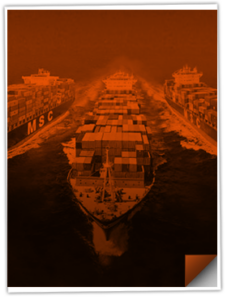Featured Headlines:
US Duels Against Russian Fuels
Europe’s Air Share Up in the Air
No Ocean Carrier Profit Barrier
Russian Trade Repercussions Made
Canada Goes Into Withdrawal
- Canada has withdrawn the Most-Favored-Nation (MFN) tariff from all goods that originate in Russia or Belarus.
- As of March 2, 2022, all Russian and Belarusian exports to Canada will be subjected to a 35% tariff.
- The order does not apply to goods that were in transit to Canada on or before March 2nd.
- Click here to read the notice from the Canada Border Services Agency (CBSA).
US Duels Against Russian Fuels
- On Tuesday, President Biden announced plans to sign an Executive Order banning the import of Russian oil, liquified natural gas (LNG) and coal to the US.
- Click here to read the official White House statement.
- The UK is also phasing in their own restrictions on Russian fuel imports.
Domestic Pit Stop Back Drop
- The US LTL trucking market grew by 20.4% in 2021, producing a record revenue of $50.7 billion. Among the top 25 carriers, 15 grew by more than 20% and 5 grew more than 30%.
- The Department of Energy announced that the average price of diesel fuel has reached $4.85/gallon—a 75-cent increase in one week. In the California market, diesel is averaging an astounding $5.76/gallon. The US and California averages are the highest in history.
- FlexiVan’s CEO, Ron Widdows, warned the shipping public that chassis manufacturers will not be able to keep up with current demand and the needs of US shippers.
- Average chassis usage has reached 14 days with a whopping 24% exceeding 14 days; the inefficient usage and long dwell times of chassis exacerbates today’s broader under-supply.
- Average drayage booking lead times have remained above 8 days for Seattle, Los Angeles, New York, Norfolk, Miami, and much of the Gulf Coast.
Europe’s Air Share Up in the Air
- As more and more airlines are banned from Russian airspace, and avoid the airspace above Ukraine, shippers are seeing increased fuel surcharges, higher freight rates, and war surcharges. Not only is the actual cost of fuel rising, but airlines must also fly longer routes to avoid restricted airspace.
- Similarly, the EU and UK have banned all Russian aircraft from their airspace, which removes even more air capacity from the market. Of greatest impact, Volga-Dnepr Group’s AirBridgeCargo has removed all their aircraft from Europe.
- Some airlines have simply suspended services between Asia and Europe based on risk assessments, fuel usage, and fleet limitations; this will certainly put continued upward pressure on airfreight rates while lowering European capacity.
The Global Shipping Grab Bag
- Global ocean carrier schedule reliability reached a record low of 30.9%; Evergreen Marine Corp came in last place at 15%.
- The average worldwide vessel waiting time at port was 7.38 days down—about 4%— from December; this is the sixth straight month above 7 days globally.
- Most air cargo providers from Hong Kong have suspended trucking services from mainland China citing untenable border waiting times. Hong Kong’s continued struggles with Covid, border restrictions and quarantine rules have choked its transportation systems. Air China suspended all flights from Hong Kong to JFK for 2022.
- The US and Canada joined the EU and UK in banning all Russian aircraft from American and Canadian airspace.
No Ocean Carrier Profit Barrier
- After losing money for 21 consecutive quarters, Hyundai Merchant Marine returned to profitability in Q3 2020, making a reported $100 million. In 2021, the Korean carrier made an astounding $4.4 billion— a 4400% improvement over 2020!
- Similarly, COSCO grew by 900% in 2021 and reached profits of $14B.
- Never to be outdone, Maersk reported 2021 profits above $17B.
Russian Trade Repercussions Made
- The US Secretary of Commerce, Gina Raimondo, cautioned Chinese chip makers and other technology manufacturers that failure to follow US restrictions on exports to Russia will provoke the US to block the purchase and export of essential American equipment and software. US technology is needed for Chinese manufacturing.
- The Biden Administration also threatened to add more Chinese companies to their trade “blacklist” if they attempt to skirt export restrictions to Russia.
- The US Department of Commerce has mobilized staff around the world to halt illegal shipments of computers, aircraft parts, shipbuilding supplies, and many technologies to Russia.



